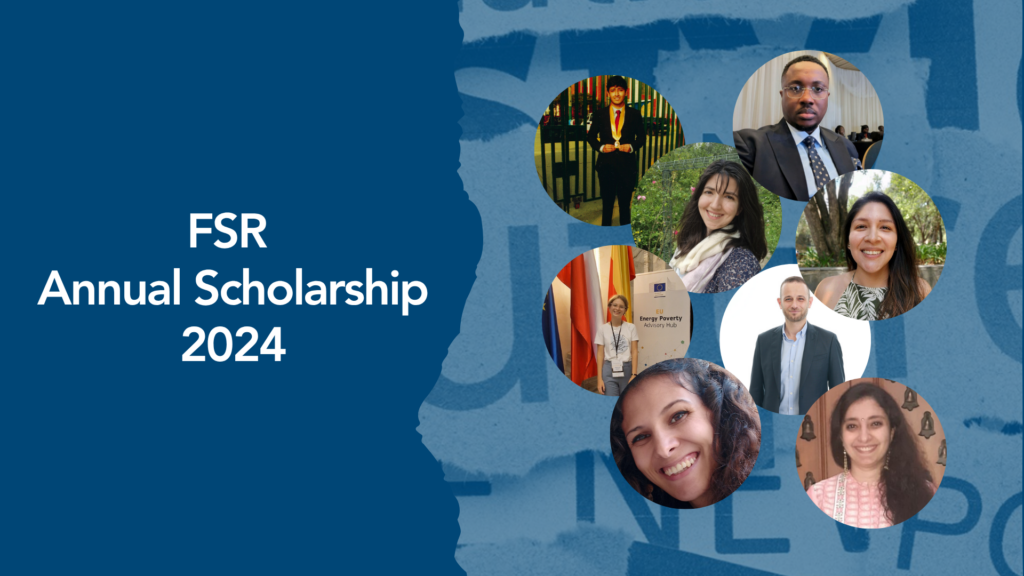Every year, the Florence School of Regulation awards scholarships to motivated professionals and researchers from around the world who share a common purpose: driving the global energy transition. These scholarships open the door to specialised training and international collaboration, helping participants translate learning into action in their own countries and institutions.
In 2024, 19 participants from different continents joined FSR courses through the annual scholarship programme. For all recipients, the FSR Scholarship represented more than financial support; it was an opportunity to grow, connect, and contribute to the future of energy regulation. Their diverse experiences reaffirm the power of knowledge-sharing and collaboration across borders.
Why they applied
For many, the decision to apply stemmed from a mix of passion, purpose, and opportunity.
Several recipients, like Michael Kolakowski, saw the scholarship as a way to develop professional qualifications in the area of green public policies and align national priorities with the European Green Deal. Others, such as Lorena Cordero Maldonado, applied because “as a junior professional in Latin America, access to advanced and specialized training is extremely limited. This opportunity represented not only financial support but also a bridge to the knowledge and international collaboration needed to drive sustainable energy transitions in my region.”
Others were drawn by the FSR’s international reputation and academic quality. “I have been following FSR professionally for a long time and I would say I am an FSR aficionado,” shared Lachezar Stanchev. And for Halina Jagielska, the decision was also guided by professional respect: “I highly value the academic and research work of Florence School of Regulation, and of the European University Institute. I was sure that attending the course would give me an extraordinary opportunity to interact with top experts in the fields of energy and regulation, as well as with other participants who brought their own specific knowledge, and this turned out to be true.”
For Matthew James Barrera Villanueva, who followed the ‘Regulation of the Power Sector’ course, the scholarship was a chance to gain “solid knowledge of the fundamentals of regulation in every activity related to the power sector (generation, transmission, distribution and retail) as well as the possibility to exchange thoughts and share experiences with colleagues from abroad through the weekly forums and office hours programmed in the course.”
What the scholarship meant for them
For most, the scholarship marked a turning point in their professional growth.
“The scholarship has been transformative for my professional growth,” said Lorena, who attended the Sustainable and Smart Cities course. “As a city advisor, the course gave me practical tools to support municipalities in designing and implementing low-carbon and inclusive urban energy strategies.”
Others highlighted how the experience expanded their horizons. “Thanks to this experience, I am better equipped, as a national-level civil servant, to participate in and contribute to the ongoing process of calibrating Europe’s green agenda in a constructive and informed way” said Michael.
Uzoma, from Nigeria’s energy regulatory authority, also emphasised the practical benefits: “The scholarship has enabled me to obtain practical knowledge from the course coordinators, guest lecturers and the incisive contributions from seasoned professionals… I have started sharing ideas and learning points with my colleagues and management and have begun implementing these learning points in my work at the Commission.”
How the course developed their careers
Participants pointed to the course’s depth and practical orientation as key to their professional development.
For Michael, the training “provided complex and well-structured insight into the socioeconomic context, regulatory frameworks, and technological pathways shaping the transition,” while Lachezar noted that it “strengthened my confidence, added further knowledge and different perspectives, ultimately opening a new area of competence for me.”
Disha Dinesha Lagadamane shared how the course she followed inspired applied research and innovation in her case “The course helped me in designing policy and regulation for blockchain enabled smart microgrids (BSMGs) (…) I was able to link what I had learnt during the course and through additional reading of experts’ research to propose energy policy for adoption of BSMGs.”
For Irene Vettori the course was a nice opportunity to learn something new and to compare perspectives and points of view with others. “All in all, the course endorsed me to dive more into regulation for designing proper investigations on clean energy.”
What they liked most
When asked what they enjoyed most, the answers were as diverse as their backgrounds, yet all reflected a shared sense of engagement and intellectual stimulation.
“The EUI offers a unique opportunity to engage in candid and informed exchanges with practitioners who have extensive first-hand experience in EU institutions,” said Michael, praising the “excellent e-learning platform” that supported asynchronous learning.
For others, interaction and collaboration stood out. “Discussion forums, live sessions with experts, and the final case study (group project),” said Disha succinctly. Chloé-Désirée described her course as “a perfect blend of experts’ lectures, practical discussions and teamwork,” while Matthew valued “the interaction with the instructors throughout the entire course” and the chance to explore how “every country has their own reality.”
“The overall atmosphere created during the course was awesome – very creative, well-structured and the lecturers exceptionally approachable,” shared Lachezar. Irene highlighted the “stimulating talks given by invited speakers and the possibility to access helpful material before the live classes.”
The courses for which we awarded free seats were: Annual Training on the Regulation of Energy Utilities; Clean Molecules for the Energy Transition; EU Gas Network Codes; Evolution of Electricity Markets in Europe; Executive Course to Master Electricity Markets; Loyola Autumn Research School; Specialised Training on the Regulation of Gas Markets; Regulation of the Power Sector; Summer School on Regulation of Energy Utilities; The EU Green Deal; Electric Vehicles; Executive Course to master European Hydrogen Legislation, REMIT and its implementation, Summer School on Transport Regulation.
All the winners:
- Chloé-Désirée Beugnies
- Disha Dinesha Lagadamane
- Lorena Cordero
- Štěpán Vizi
- Adamu Adamu Yunusa
- Halina Jagielska
- Michal Kolakowski
- Iaroslava Vlasova
- Gaia Ariaudo
- Lorenzo Vilona
- Matthew James Barrera Villanueva
- Lachezar Stanchev
- Sebastian Arroyo Klein
- Irene Vettori
- Eliška Beranová
- Elena Andreea Niculescu
- Nicholas Schiappacasse Cruz
- Uzoma Kingsley Agbanyim
- Mattia Cugini
Learn more about the FSR Annual Scholarship Programme and apply for the 2025 edition: fsr.eui.eu/training/scholarships
Learn more about FSR courses
Our courses are designed and continuously updated to meet the educational needs of professionals in the fields of energy, climate, water and transport. The courses are developed with the support of an outstanding international training faculty, which includes professors from top universities as well as high-level experts in energy regulation, policymaking, and industry. We offer different types of training: Online, Residential, Blended and Tailor-made courses in all levels of knowledge. Browse all our courses.






